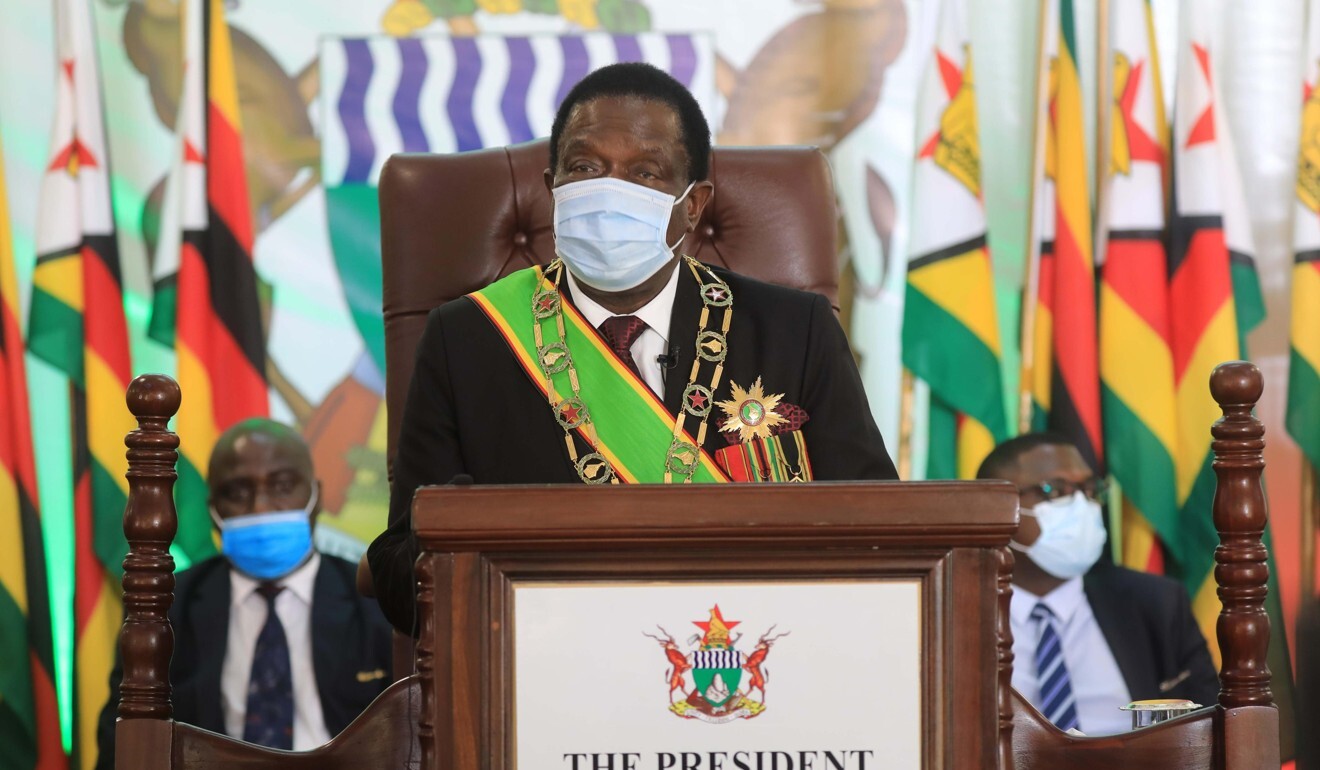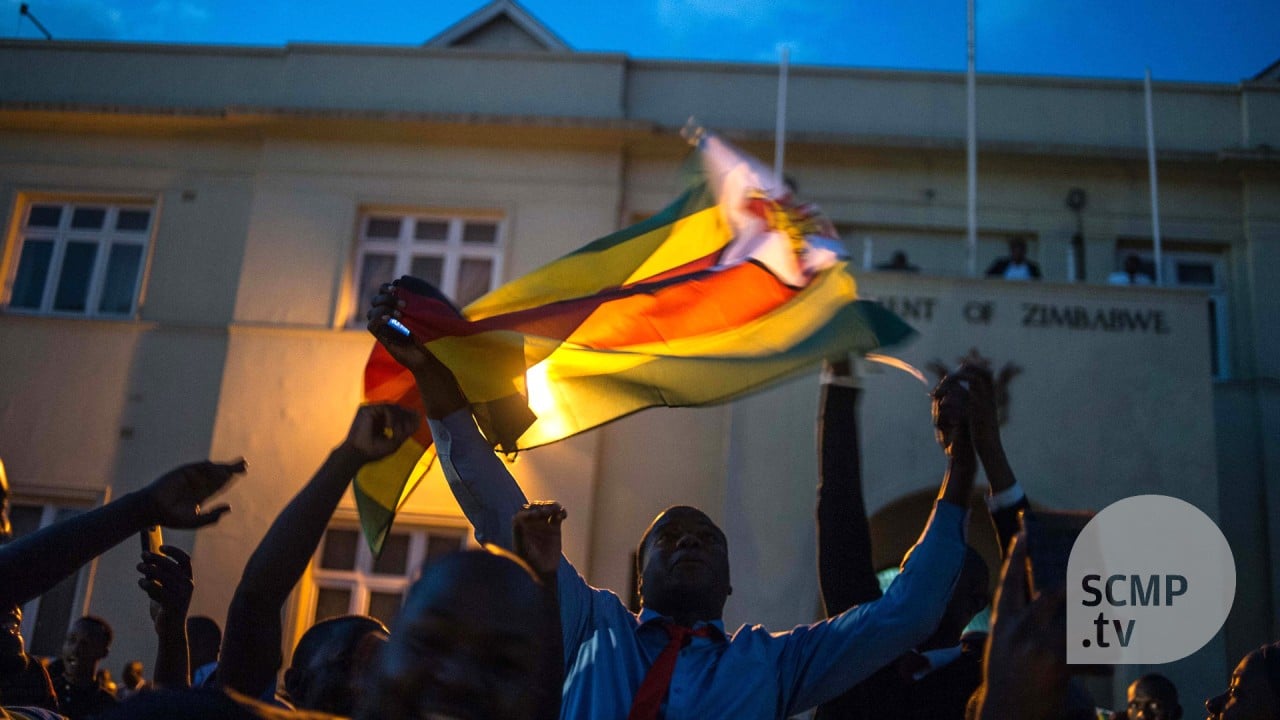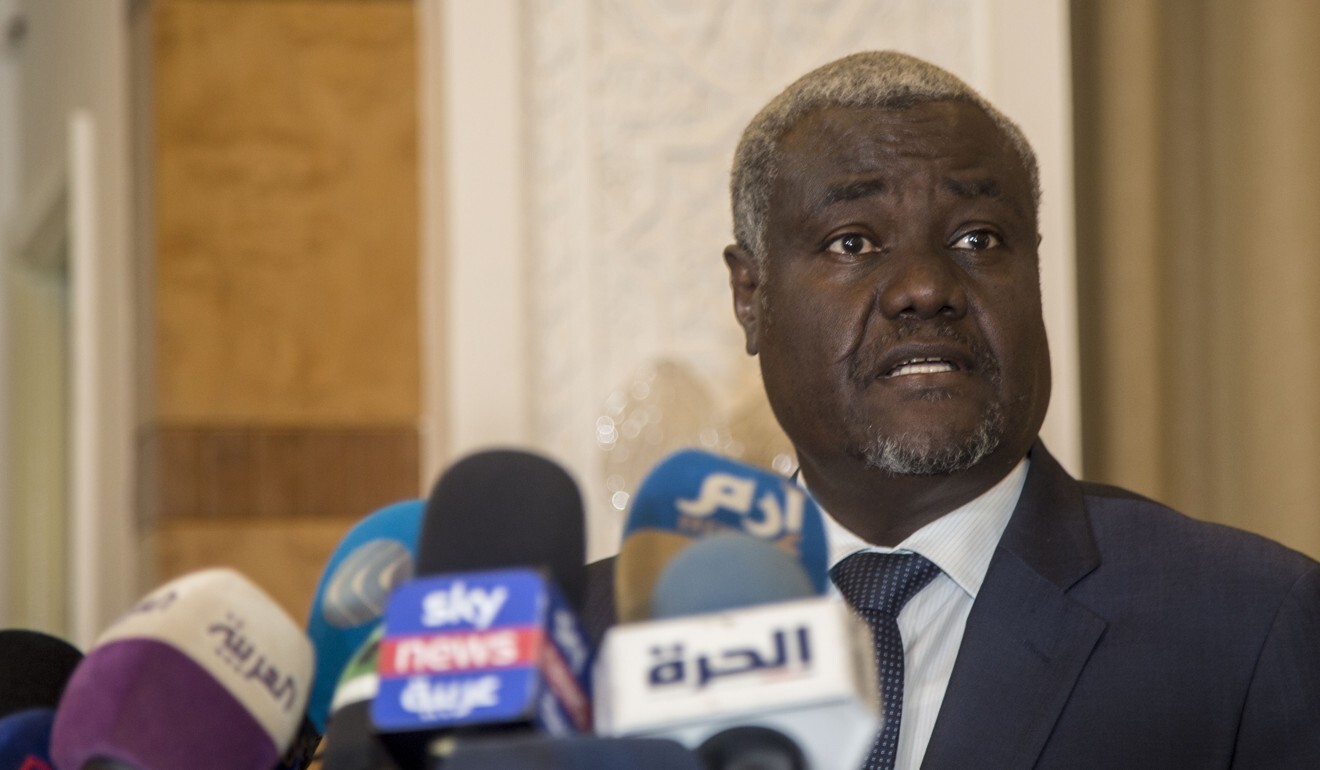
China renews call for Zimbabwe sanctions to be lifted
- Hampered by sanctions instituted nearly two decades ago, the southern African nation has been further hit by restrictions imposed to limit the coronavirus
- President Emmerson Mnangagwa thanks China, Russia and other African nations that have stood by Zimbabwe as ‘dependable pillars’
China has reiterated its support for the lifting of sanctions on Zimbabwe at a time the African nation is struggling to contain the spread of coronavirus.
Zimbabwe, which has reported 8,276 confirmed coronavirus cases and 237 deaths, has seen its economy take a hit, after authorities imposed restrictions to prevent the spread of the virus. The International Monetary Fund projects the nation’s economy to contract by 10.4 per cent this year.
Wu Peng, the head of African affairs at China’s foreign ministry, said on Sunday that the “unbearable inflictions upon millions of Zimbabweans are devastating”.
“We strongly support the appeals for the unconditional lifting of sanctions against Zimbabwe,” Wu said, the same day Zimbabweans demonstrated in the streets of Harare and other towns, seeking the end of sanctions that had been imposed almost two decades ago by the US and some European nations over human rights violations and a policy of seizing land from white farmers.

In Harare, the Chinese ambassador to Zimbabwe, Guo Shaochun, said that the sanctions had been aimed at “targeted individuals” but hurt the country and its people.
“They spook investors, disrupt financial transactions between Zimbabwe and foreign countries and disable Zimbabwe’s access to credit from international financial institutions, which are needed for the country’s development,” Guo said.
China’s foreign ministry spokesperson Zhao Lijian on Monday said that the sanctions “have seriously damaged Zimbabwe’s ability to develop its economy”.
Zhao said China “firmly supports Zimbabwe and other African countries in opposing external interference and pursuing the path of independent development”.
China has long been an ally of Zimbabwe, even when sanctions were imposed in the early 2000s. The farm seizures were meant to redress colonial-era land grabs but contributed to the country‘s economic decline and ruined relations with the West.
Beijing ignored calls from the West for it to stop working with the African nation over the former president Robert Mugabe’s record on human rights. Mugabe stepped down as president in 2017 and died in 2019, at the age of 95.
Since 2001, China has faced growing pressure from the West to stop financing Zimbabwe’s “undemocratic” regime. China defends itself by saying it does not interfere in the domestic affairs of other countries.

01:10
Zimbabweans celebrate on the streets as Robert Mugabe resigns
Instead, it offered both political and economic support in the form of aid and loans, as well as diplomatic support at the United Nations.
Beijing extended US$3 billion worth of loans to Zimbabwe between 2000 and 2018, according to the China Africa Research Initiative at the Johns Hopkins School of Advanced International Studies. Still, Harare has been in default since the country fell into recession in 2008.
In 2008, as a veto-holding member of the UN Security Council, China helped Zimbabwe escape sanctions that would have included an arms embargo, and financial and travel restrictions on senior government and military officials.
Stand-off with Chinese and private creditors threatens to deepen Zambian debt crisis
At the time, Russia, which is a major arms exporter to African countries, also vetoed the UN sanctions proposed by the US and Britain.
On Sunday, Zimbabwean President Emmerson Mnangagwa thanked China, Russia and other African nations that have stood by Zimbabwe as “dependable pillars”.
“These nations not only assisted us in our fight for independence but equally assisted us to defend our sovereignty against the sustained onslaught by our detractors,” Mnangagwa said.
After 20 years, there’s more than economic exchange in China’s relationship with Africa
Mnangagwa said that the sanctions, imposed by the US in 2001 under the Zimbabwean Democracy and Economic Recovery Act and executive orders by President George W. Bush, have constrained the much-needed development for the Southern African country for nearly 20 years.
In September, Zimbabwe announced a US$3.5 billion package to compensate white farmers whose land was forcefully taken away by the Mugabe regime in 2000 and 2001 as part of a resettlement programme for black families. Compensation for farmers is among the conditions Washington has set before it will lift the sanctions.
Julian Braithwaite, the British ambassador to the WTO and UN in Geneva, welcomed Harare’s commitments to resolving outstanding land issues.
“We encourage Zimbabwe to take credible steps to ensure the viability and security of tenure in the 99-year leases, stop further farm invasions, ensure continued progress on compensation,” Braithwaite said late last month.
“Taking these actions on land is critical to unlocking international investment into the agriculture sector in Zimbabwe.”
Moussa Faki Mahamat, chairman of the African Union Commission, also backed the lifting of sanctions, saying that the 55-member African Union was worried about the negative impact of their impact on Zimbabwe’s economy and people.

The US continues to defend the sanctions, saying they were intended to help bring about political and economic reforms.
“US sanctions focus on those who undermine democracy in Zimbabwe. The government should protect and expand space for constructive dissent from the opposition, civil society, and ordinary citizens,” said Tibor Nagy, the assistant secretary for the US State Department’s bureau of African affairs.
The calls to remove the sanctions are being led by the Southern African Development Community (SADC), which comprises 16 states including Zimbabwe.
“The prevailing Covid-19 pandemic has further placed serious constraints on the government of Zimbabwe’s ability to fund programmes, as well as investments in key economic sectors,” said Filipe Nyusi, president of Mozambique and chair of SADC.
The SADC call for the removal of sanctions has also received the backing of the United Nations Secretary-General, Dr Antonio Guterres, and the UN Human Rights Commission.
Donald Trump moves to end Sudan’s terror listing
Sudan, another target of US sanctions, got a reprieve on Friday when US President Donald Trump announced the decision to remove it from a US list of state sponsors of terrorism.
However, Sudan had to agree to a deal with Israel, becoming the third Arab country to normalise relations with the Jewish state.
Sudan also agreed to pay US$335 million to the estates of victims of the 1998 US embassy bombings in Kenya and Tanzania; victims of the USS Cole attack, in 2000; and the family of USAID employee John Granville, who was assassinated in Khartoum in 2008.

